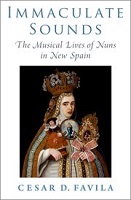Immaculate Sounds
The Musical Lives of Nuns in New Spain
| dc.contributor.author | Favila, Cesar D. | |
| dc.contributor.editor | Hirschy, Norman | |
| dc.date.accessioned | 2023-11-02T09:51:27Z | |
| dc.date.available | 2023-11-02T09:51:27Z | |
| dc.date.issued | 2023 | |
| dc.identifier | OCN: 1381313109 | |
| dc.identifier.uri | https://library.oapen.org/handle/20.500.12657/77184 | |
| dc.description.abstract | In Catholic doctrine, the Immaculate Conception of the Virgin Mary is the belief that Mary, the mother of Christ, was exempt from original sin from the moment of her conception, and thereby a co-redeemer alongside her son. Praise for this complicated devotion took place in Europe throughout the medieval period and resounded in the Americas with the founding of the first convent in Mexico City under the Order of the Immaculate Conception in 1540. All other orders of nuns in New Spain branched out from this convent, spreading the Marian devotion throughout the region. In this book, author Cesar D. Favila argues that the sonification of virginity and the Virgin Mary was fundamental to the promotion of the Immaculate Conception doctrine, and that this was part of a complex network of sonified practices in the lives of New Spanish nuns. These ""immaculate sounds,"" a term Favila uses for the cloistered nuns' idealized vocalizations as well as the expression of doctrinal rhetoric through musical metaphors, echoed the highly regulated realm of the convent and played a pivotal role in mediating between the lives of New Spanish nuns and the expectation that they would save the secular world with their vocalized prayers. In addition to the sonification of discipline, Favila shows that immaculate sounds also enhanced the nuns' engagement with their religious practices and facilitated embodied and spiritual engagement with Catholic doctrines. Throughout his study, he delves into rarely studied music sources from seventeenth- and eighteenth-century New Spain alongside the rulebooks, devotional literature, and nuns' biographies that regulated convent life and inspired nuns' hymns. In doing so, Favila brings together a narrative of salvation that shines a light on the musical lives of nuns and locates women's agency within a hierarchical society that silenced some women and required others to sing. | en_US |
| dc.language | English | en_US |
| dc.relation.ispartofseries | Currents in Latin American and Iberian Music | en_US |
| dc.subject.other | New Spain, 17th century, 18th century, Convents, Sacred music, Devotion, Discipline, Sound, Voice, Virgin Mary, Salvation, Villancicos, Puebla, Mexico City | en_US |
| dc.title | Immaculate Sounds | en_US |
| dc.title.alternative | The Musical Lives of Nuns in New Spain | en_US |
| dc.type | book | |
| oapen.identifier.doi | 10.1093/ oso/ 9780197621899.001.0001 | en_US |
| oapen.relation.isPublishedBy | b9501915-cdee-4f2a-8030-9c0b187854b2 | en_US |
| oapen.relation.isFundedBy | ddf9327b-88f3-451e-a035-99c1a9530175 | en_US |
| oapen.relation.isbn | 9780197621899 | en_US |
| oapen.collection | Toward an Open Monograph Ecosystem (TOME) | en_US |
| oapen.pages | 361 | en_US |
| oapen.place.publication | New York | en_US |
| oapen.grant.project | TOME |

